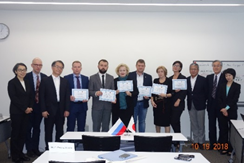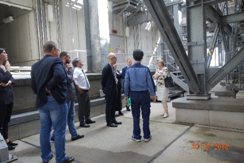Implementation of training in Japan on Energy Conservation Support Project for Russia
<Training in Japan>
Under the instruction and financial support of the Ministry of Economy, Trade and Industry (METI), the Energy Conservation Center, Japan (ECCJ) invited six trainees from Russia (comprising related members of regional governments and universities) to visit Japan over the five-day period between October 15 and 19, 2018 and implemented a training project relating to building energy efficiency, which is the main objective of Russian energy conservation policy.
The purpose of the training was as follows.
(1) Giving trainees an understanding of the Energy Conservation Act with regard to Japanese buildings, operation management and energy conservation technologies at a heat supply plant in a cold region of Japan, energy-efficient designs of buildings, and the key points for energy management, in addition to having the trainees make use of the knowledge when designing Russian building energy efficiency systems.
(2) Conducting inspection visits to Japanese energy-efficient heat supply facilities.


The training began with lectures given by the Japanese side relating to energy conservation basic policy and building energy efficiency policy. The Russian side gave reports relating to the current situation on building energy efficiency policy and the issues in promoting energy conservation.
As a reference, explanation was given on a case of an energy-efficient building design in a cold region of Japan (in the northern Hokkaido) and the design manual for cold regions was provided.
In addition, detailed lectures were given relating to the operation conditions, etc. of a heat supply plant in a cold region of Japan (Tomakomai district of Hokkaido). Comparative investigations were made against operations at a Russian heat supply plant.
Inspection visits were also made to energy-efficient heat supply plants in the Tokyo metropolitan region.
On the final day of the training, the Russian side mentioned that they would refer to the information obtained from the training when developing the Russian building energy efficiency policy in the future. In addition, the following opinions were expressed by the trainees.
1) The energy efficiency design standards for cold regions in Japan and the inspection visits to the energy-efficient buildings were extremely useful as a reference.
2) The heat supply plants were utilizing state-of-the-art technologies, which were also useful as a reference for the Russian system.
3) Trainees would also like to study about Japanese energy management in more detail.
Referring to the opinions described above, ECCJ will consider plans for future projects.

